We decided to escape London for a work trip as guests of the 15th Rome Film Festival.
As our plane descended the skies over Rome to Ciampino Airport, we could see clearly the magnificent 12th century Selce Tower that reaches skyward towards the Appian Way, the ancient Roman highway that the Roman poet Statius once described as the Queen of Roads.
Most airport journeys are soulless affairs. Not the journey from Ciampino with its Roman ruins and aqueducts glimpsed along the motorway and the majestic drive into Rome, some of it along the Appian Way. Twenty minutes later, we are in the centre of Rome.
THE MOST BEAUTIFUL MOVIE SET IN THE WORLD
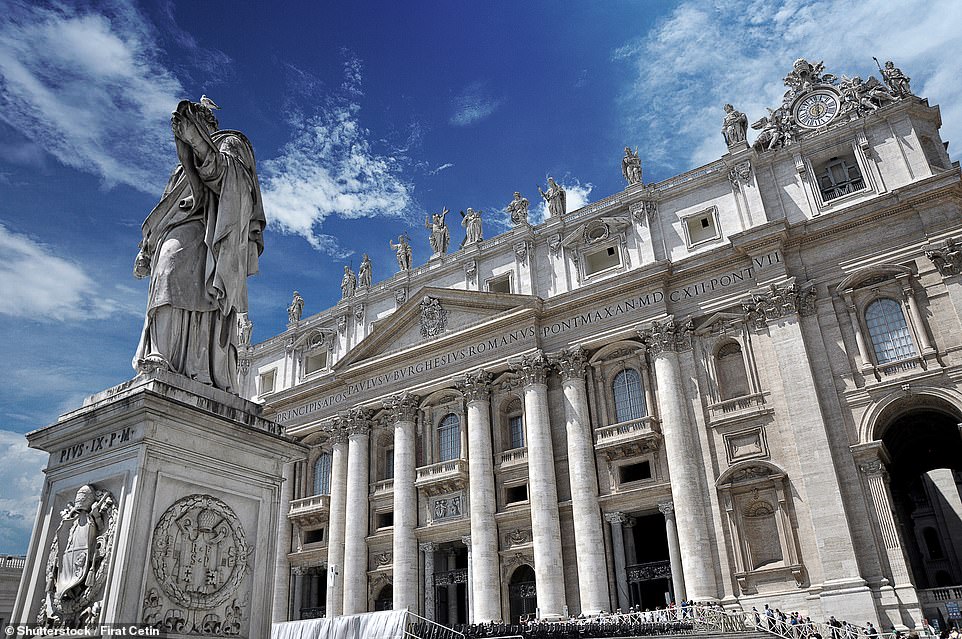
Frank’s first port of call was the Vatican Museum, pictured, where he was enraptured by Raphael’s School of Athens
Fellini described Rome as ‘the most wonderful movie set in the world’ and the Italian comedian, Alberto Sordi, was right when he described the city as ‘a big museum, a living room that shall be crossed on one’s toes’.
Our first port of call was an actual museum – the Vatican Museum. We lingered and were enraptured by Raphael’s School of Athens and the frescos in the Hall of Maps and the majestic Sistine Chapel.
Next, St Peter’s Basilica, where we marvelled at Michelangelo’s Pieta and sat in hushed silence at the tomb of John Paul II.
THE PALAZZO THAT IS IDEAL FOR A COLD WAR DEAD DROP
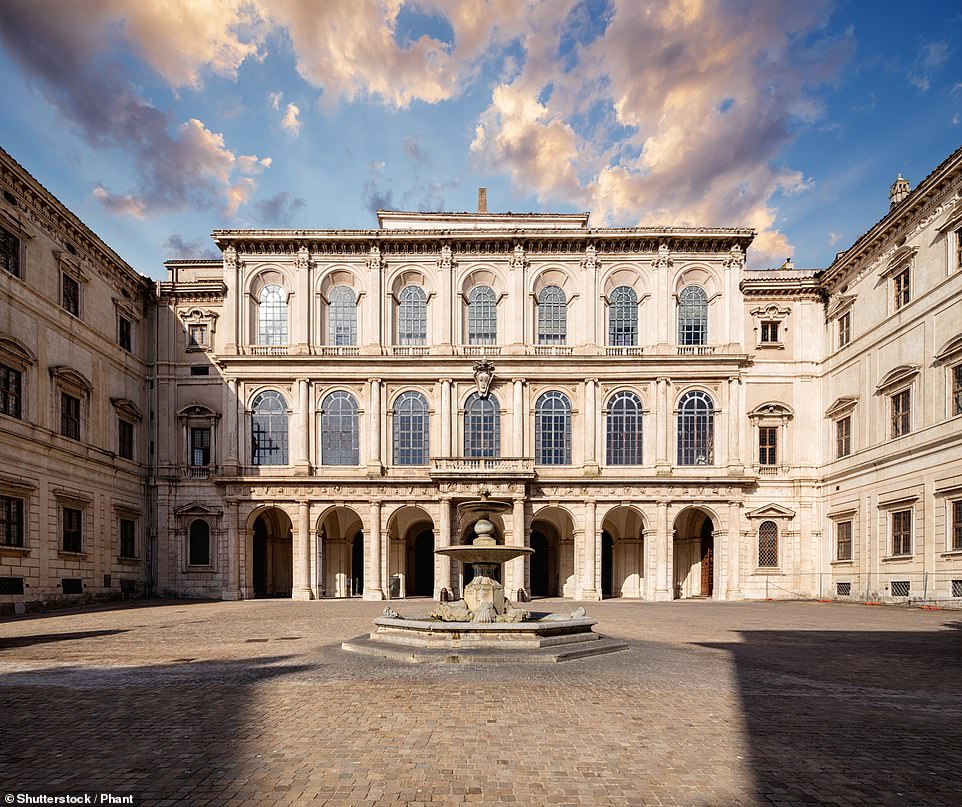
The 17th-century Palazzo Barberini, an ‘under-visited gem’ five minutes’ walk from the Spanish Steps
I was attending the Rome Film Festival, which brought in the likes of Isabelle Huppert and Mads Mikkelson, as a film producer, assembling the finance for a new TV series that I am producing, a conspiracy thriller based on the events surrounding the assassination attempt on Pope John Paul II in St Peter’s Basilica.
Ever since the era of Fellini, the Roman film industry has managed to stage-manage things with style and panache – the festival had organised for all our co-production meetings to be held in the magnificent surroundings of the 17th-century Palazzo Barberini, five minutes’ walk from the Spanish Steps. With such splendour of surroundings, it is no wonder that it was chosen as the venue for the ceremonial signing of the European Convention on Human Rights.
The Palazzo is an under-visited gem, and if you really want to delve into its art treasures, read the notorious Cambridge Spy, Anthony Blunt’s account of it. No wonder he loved it so much – its nooks and crannies are the ideal places for dead-drops.
THE MOVIE STAR GUEST FOR WHOM NOTHING IS A HASSLE AT THE HASSLER
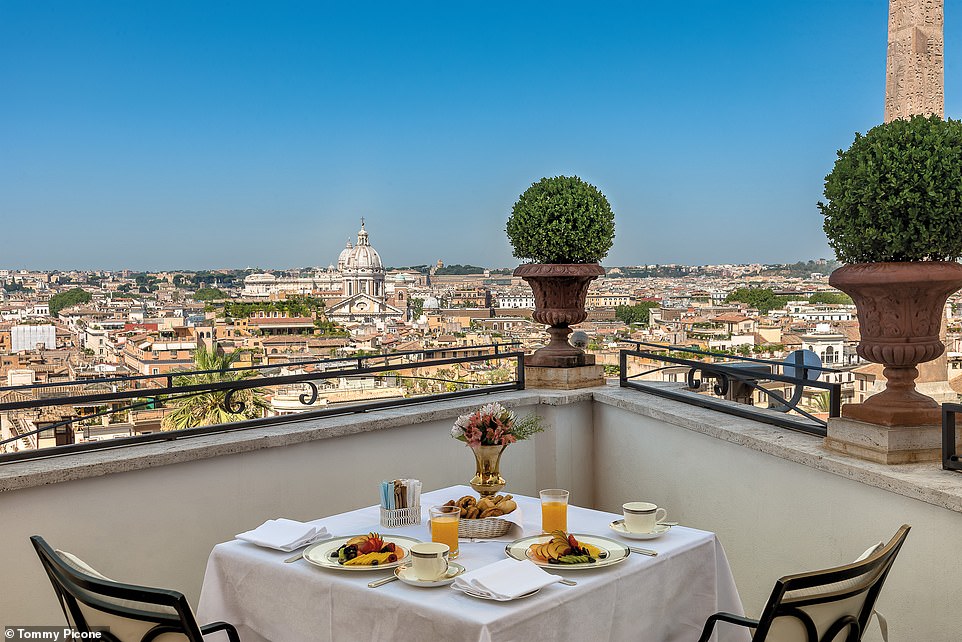
Hot property: Frank describes Hotel Hassler Roma, pictured, as ‘magnificent’
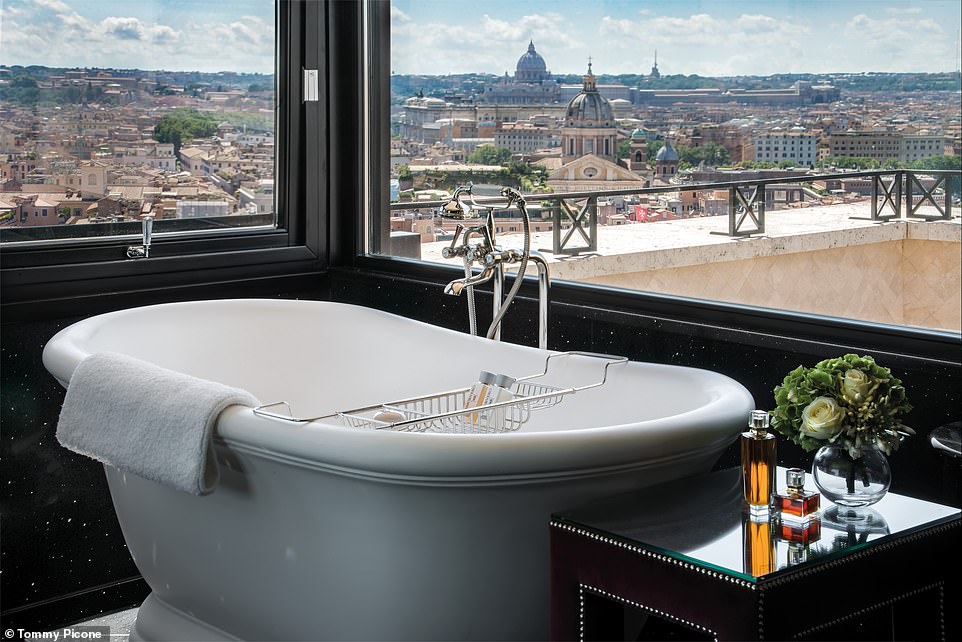
This image shows the amazing view from the ‘Hassler Penthouse’ bathroom
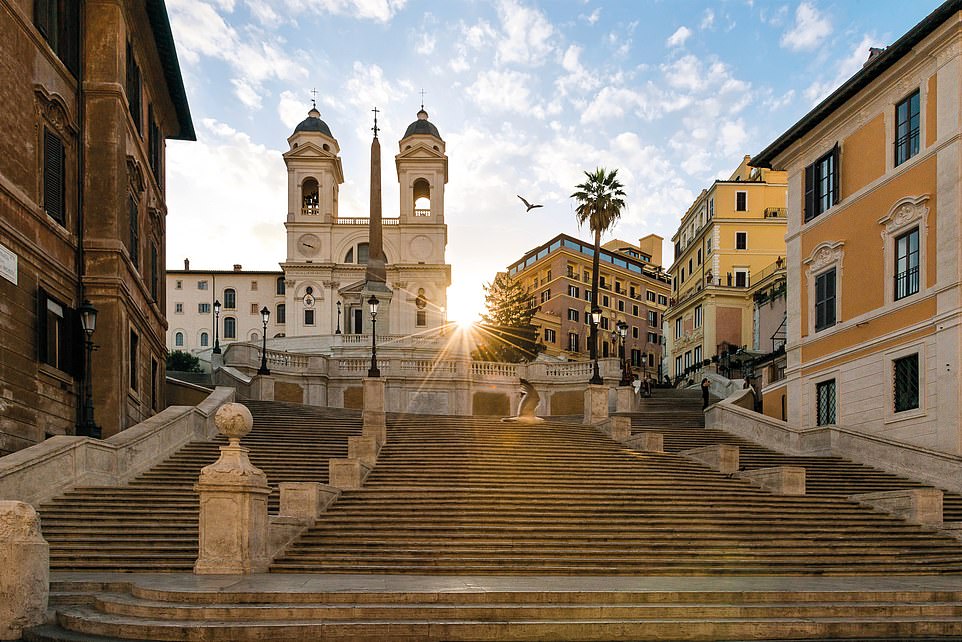
Hotel Hassler’s location is priceless – it sits at the top of the Spanish Steps (pictured to the right of Trinita dei Monti church)
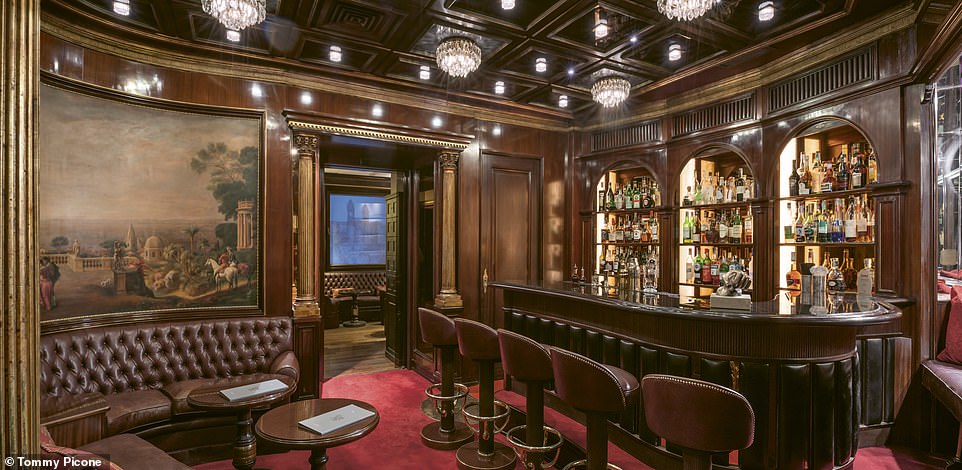
Drinking at Hotel Hassler is carried out amid impeccable decor, as this image shows
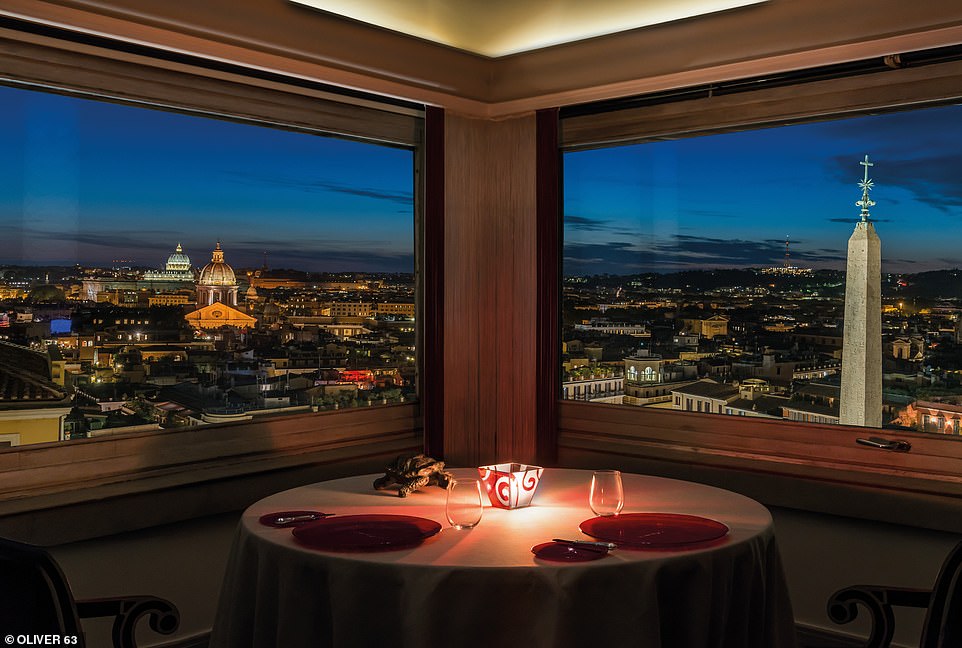
Hotel Hassler’s Michelin-starred Imago restaurant, pictured, sits on the top floor and is a reliable place to spot visiting movie stars, says Frank
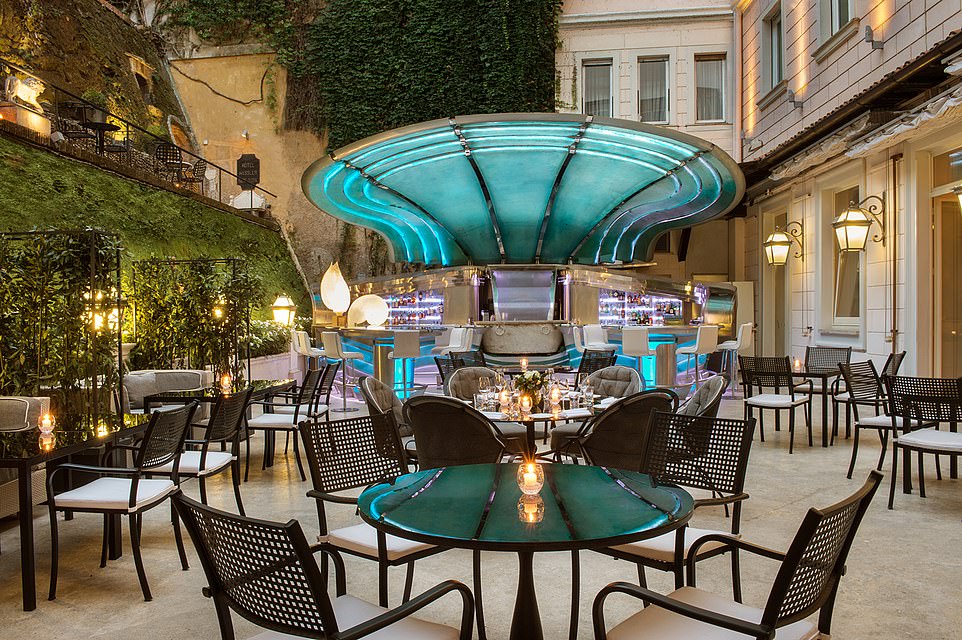
‘Tom Cruise only ever stays in the Hassler when he is in town,’ reveals Frank, ‘and given the incredible hospitality offered to all guests by its charming proprietor, Roberto Wirth, it is easy to see why’
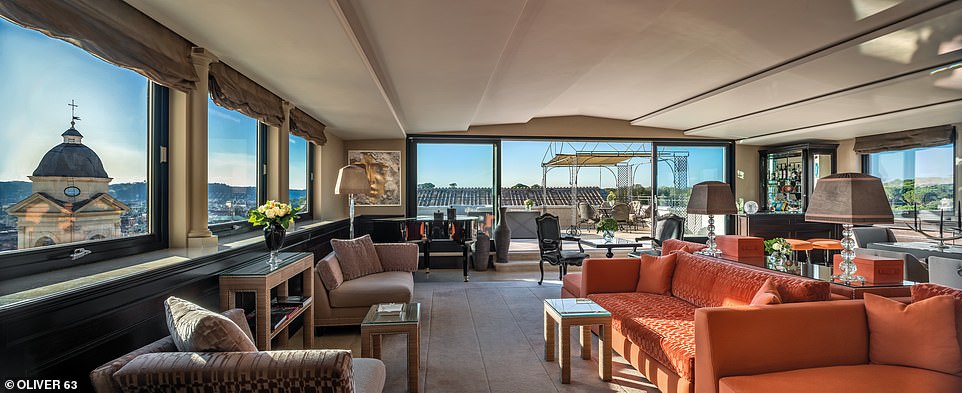
The Hassler Penthouse, pictured, has two double bedrooms, one single bedroom and two master bathrooms with ‘chromotherapy-enhanced rain showers’. And 3,552 sq ft of floor space
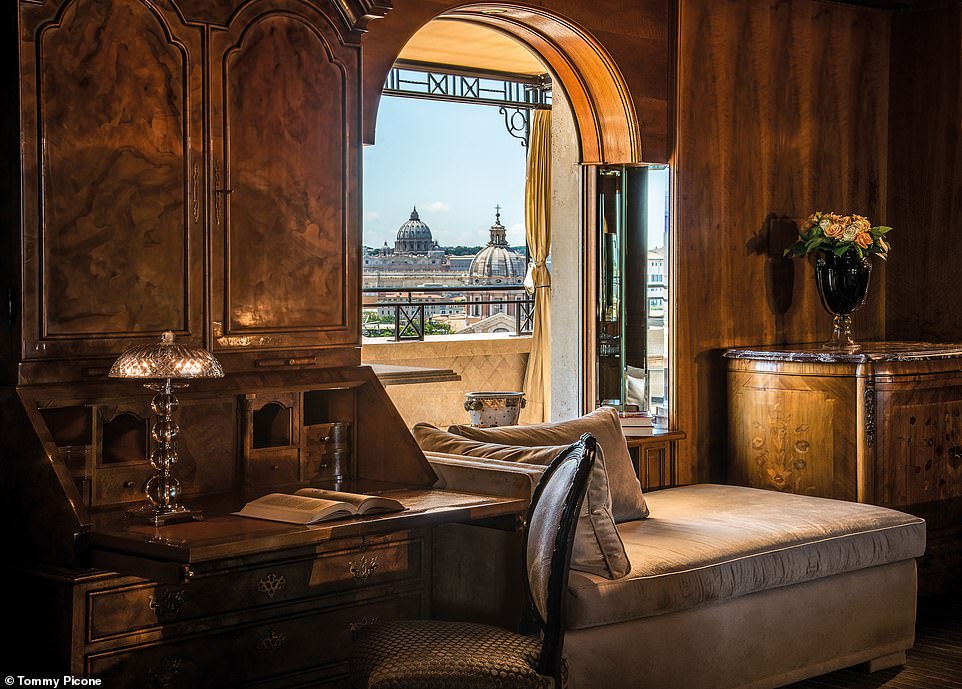
The stunning view from the Hotel Hassler San Pietro Suite, located on the sixth floor
We were not the only filmmakers in town.
Tom Cruise was single-handedly propping up the Roman economy by spending millions of dollars filming a dizzying car chase for Mission Impossible 7 from the Colosseum to the Spanish Steps.
He just so happened to be staying in our truly heavenly hotel, the Hotel Hassler Roma , albeit in a ‘bio-bubble’ in a penthouse suite.
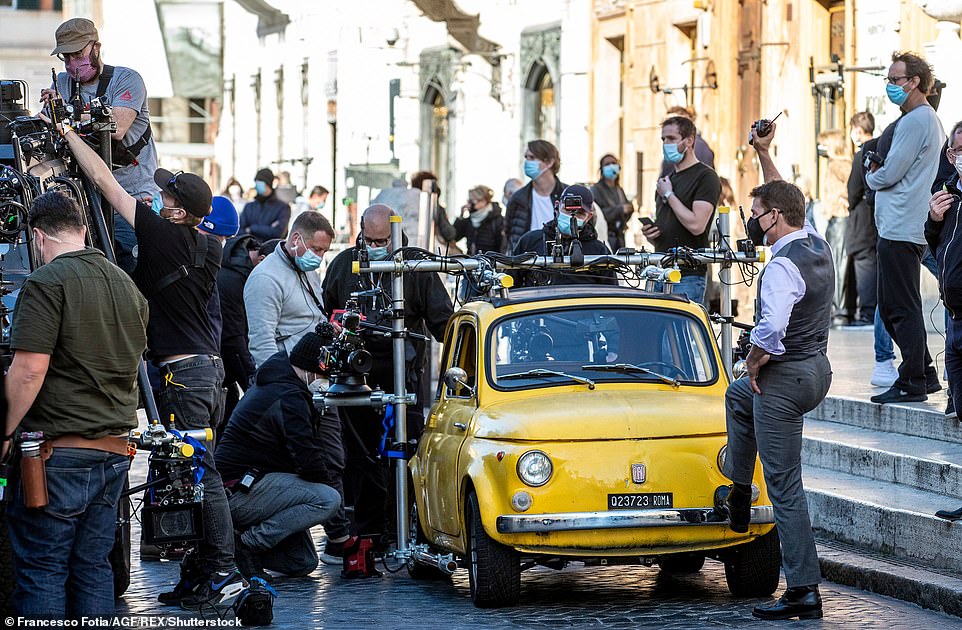
During Frank’s stay, Tom Cruise was filming a car chase for Mission Impossible 7 from the Colosseum to the Spanish Steps
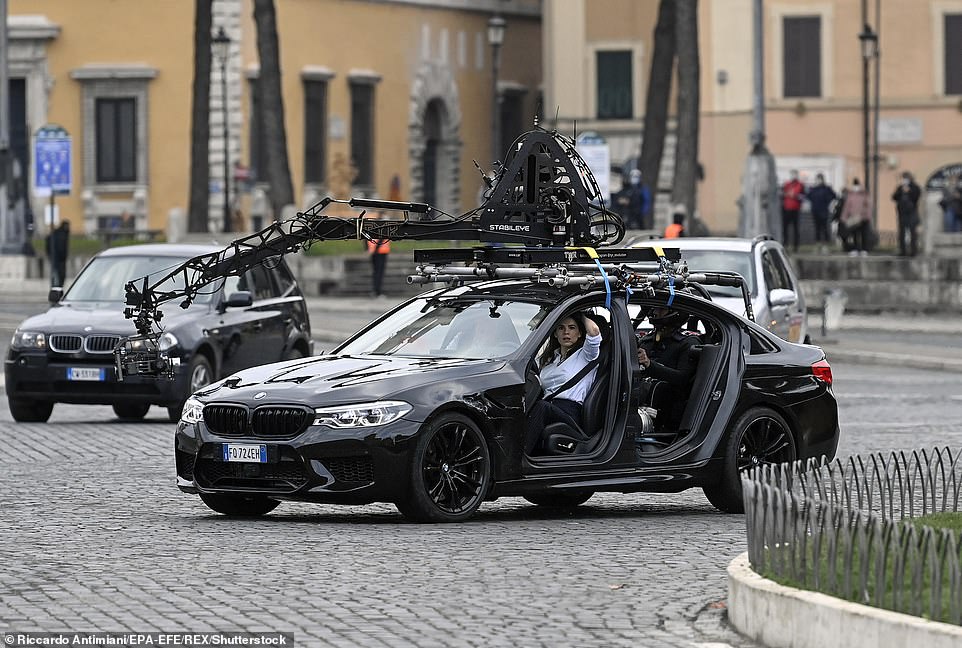
Tom Cruise with actress Hayley Atwell in a car during filming at Rome’s Piazza Venezia
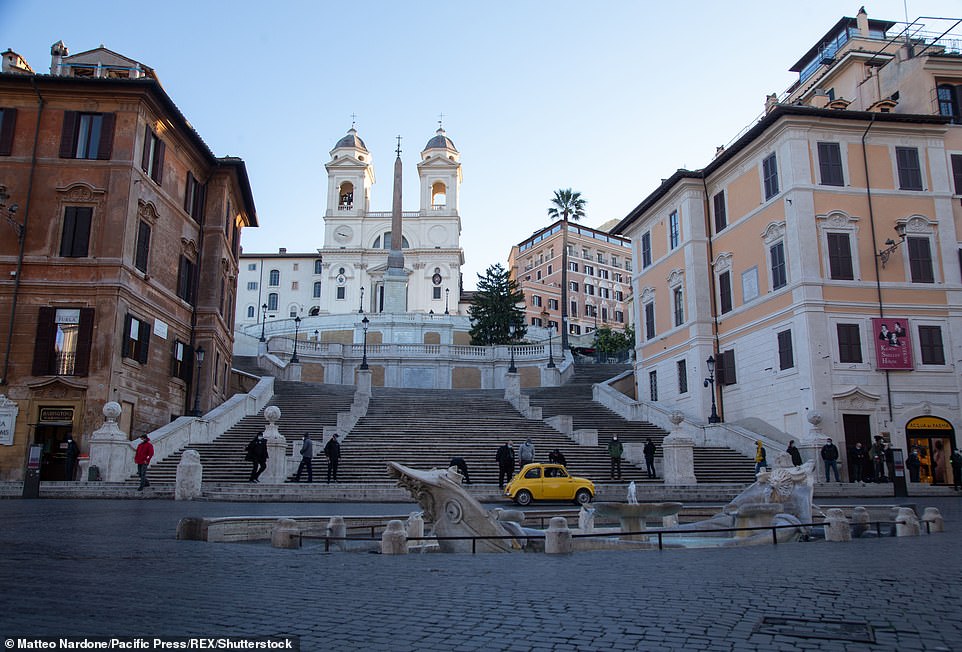
Filming for Mission Impossible 7 taking place at the foot of the Spanish Steps, with Hotel Hassler in the background
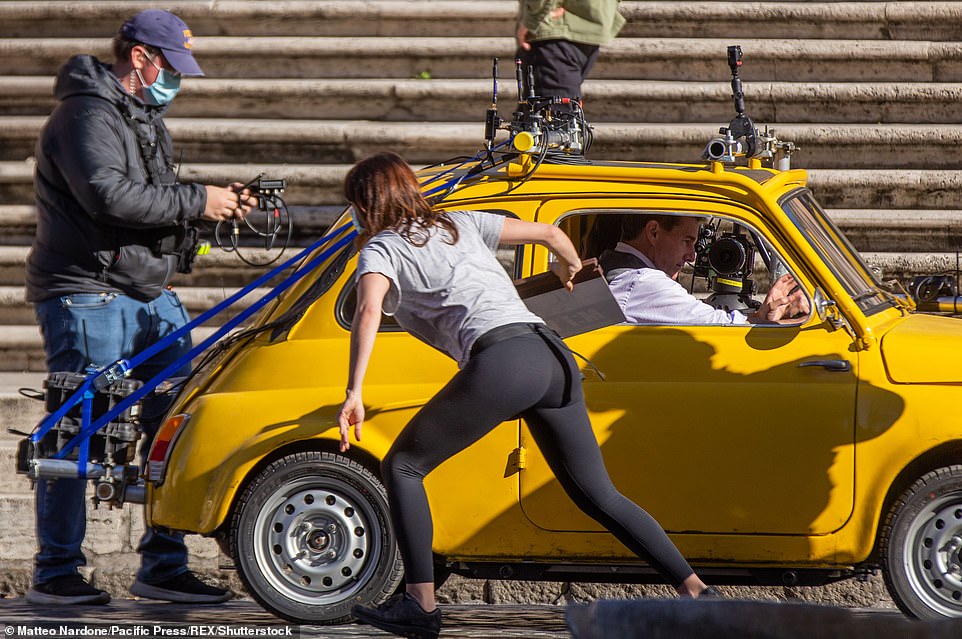
An old yellow Fiat is one of the stars of Mission Impossible 7, which is due out in 2022
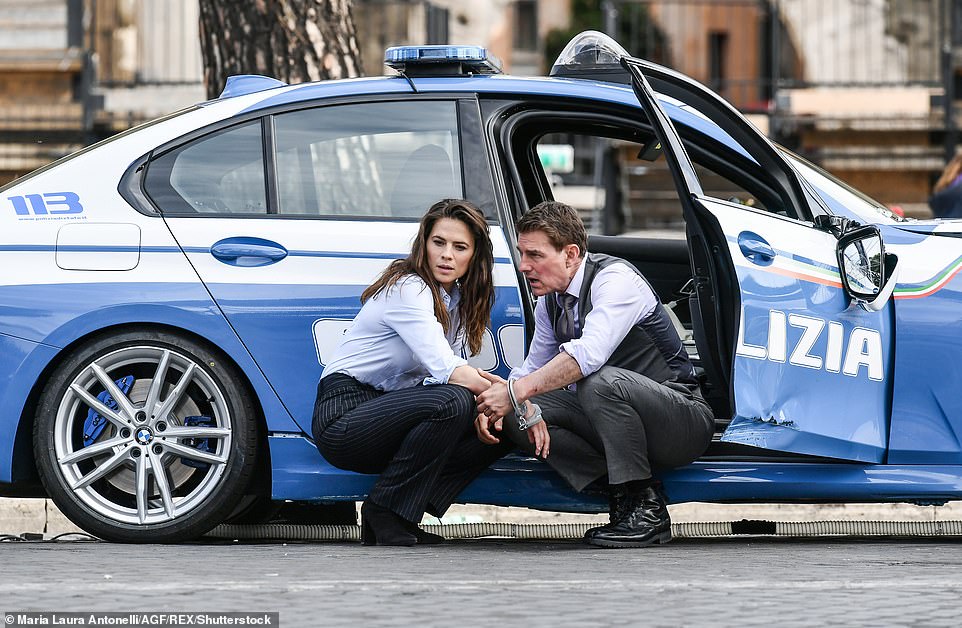
Franks says that during the shoot Cruise stayed in a penthouse ‘bio bubble’ at the Hassler
Cruise only ever stays in the Hassler when he is in town, and given the incredible hospitality offered to all guests by its charming proprietor, Roberto Wirth, it is easy to see why.
It is a magnificent hotel, with its panoramic views of the city and well-proportioned and newly refurbished rooms.
Breakfast at the Hassler in the beautiful downstairs salon was a delight, as was the amatriciana we had for lunch in the hotel bar, while its Michelin-starred restaurant, Imago, on the top floor, is a reliable place to spot at least one visiting movie star!
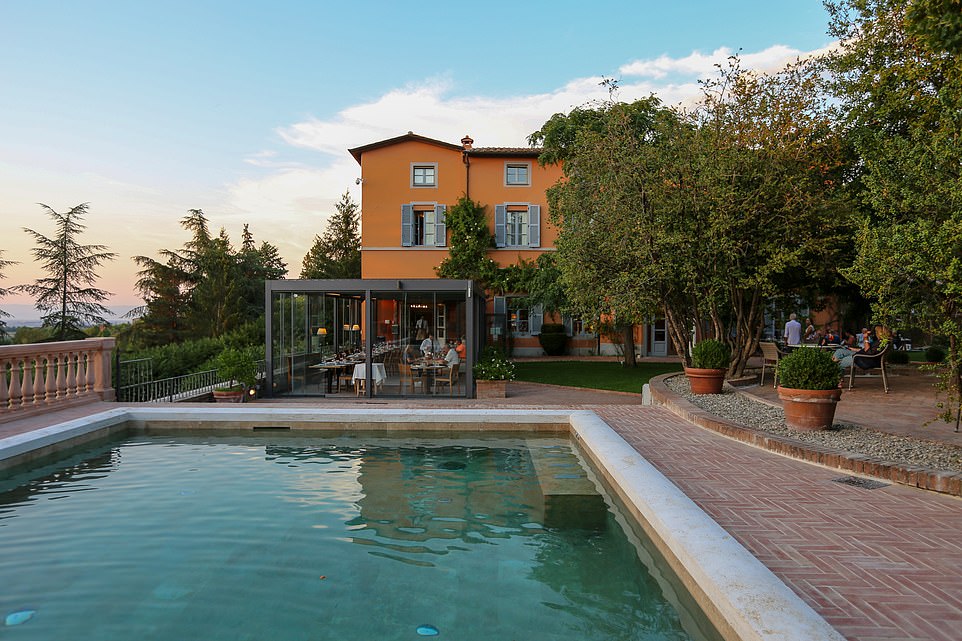
Many Hassler guests go on to stay at Hotel Vannucci, pictured, in the picturesque Umbrian town of Citta della Pieve
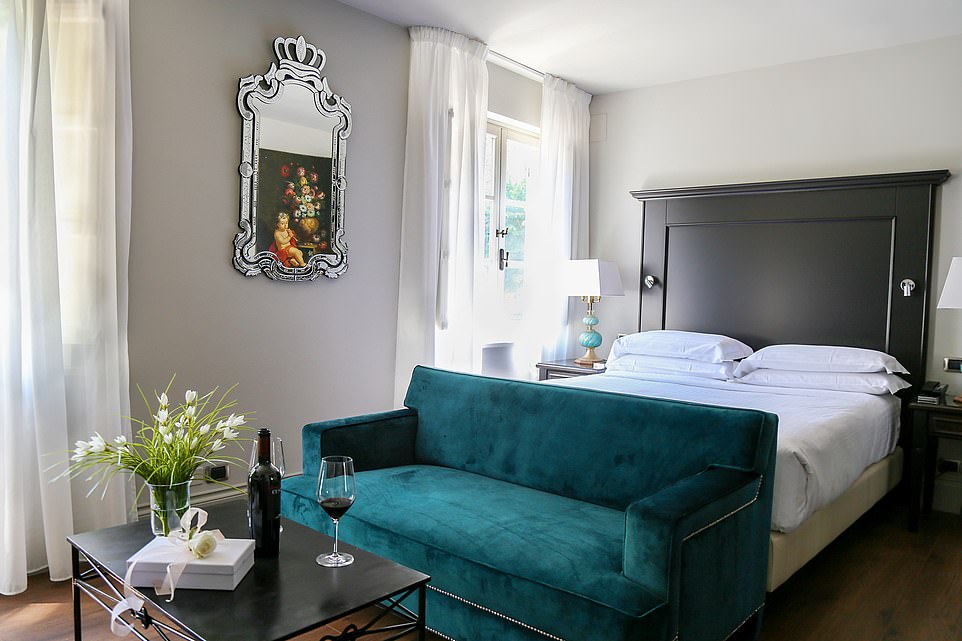
Lap of luxury: One of the opulent bedrooms at the highly regarded Hotel Vannucci
The hotel provides the most comfortable slippers (you will want to take them home with you), immaculate service and welcoming staff.
The hotel recently added four beautiful (not to mention romantic) hotel suites overlooking the Spanish Steps in the even more private 19th-century building, La Palazzetto. A stay in this hotel will live long in the memory.
The Hassler has hosted Sophia Loren, Winston Churchill and Princess Diana, and many guests go on to stay at Wirth’s equally wonderful hotel, the Hotel Vannucci, in the picturesque Umbrian town of Citta della Pieve.
THE SCENE-STEALING HOTEL WITH THE BEST BREAKFAST AND COCKTAILS IN THE CITY
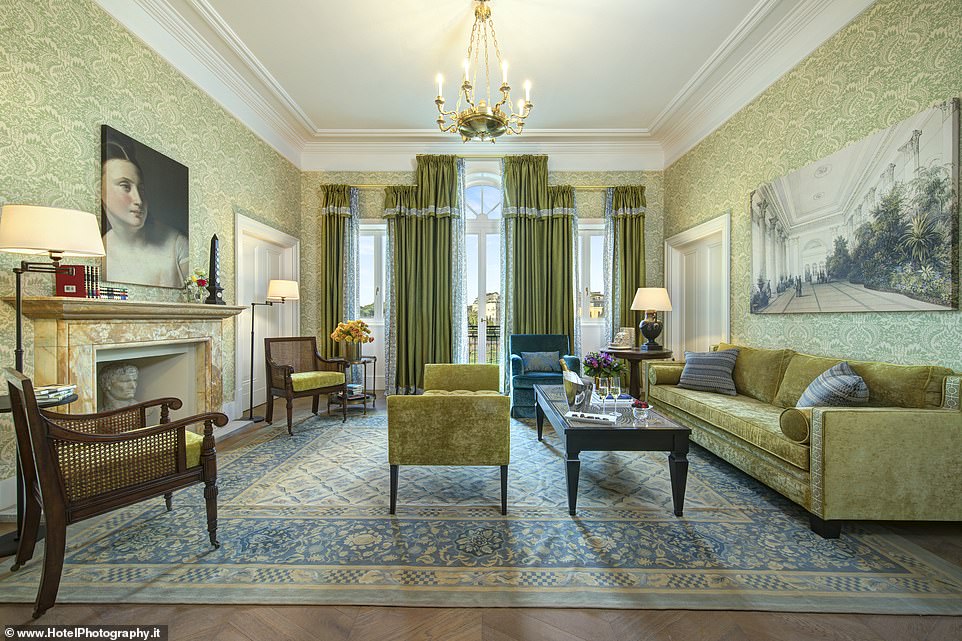
Cruise’s co-stars stayed next door at Rocco Forte’s scene-stealing five-star Hotel De La Ville, pictured
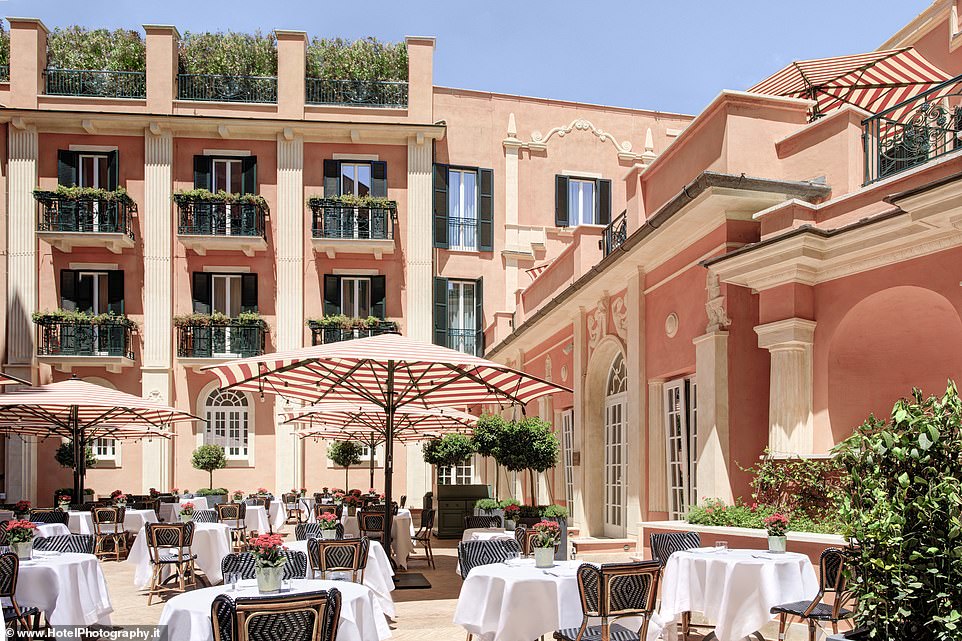
Mission Impossible’s costume and stunt departments took over the second floor of Hotel de la Ville, Frank reveals
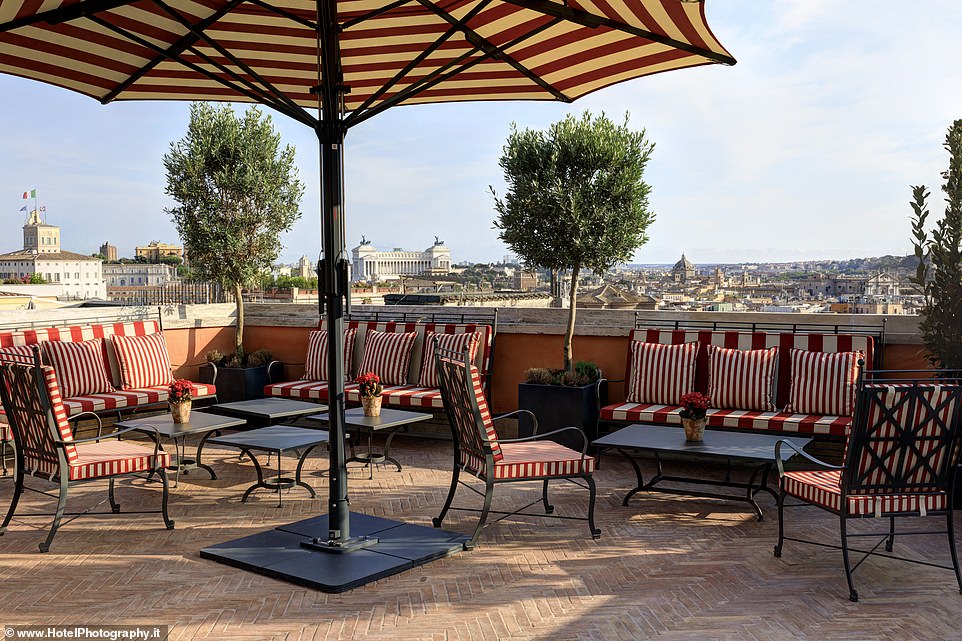
The breakfast on the glamorous Hotel de la Ville rooftop terrace, pictured, is the freshest and best in the city, claims Frank
ROME’S DISEASE-RIDDEN HISTORY…
The Roman Empire was no stranger to pandemics. The Antonine Plague in the second century claimed the life of Emperor Lucius Verus. According to an eyewitness account, it looked like the world was ending when Rome was rocked by the Plague of Cyprian in the mid-third century.
By the time the bubonic plague (named after the Emperor Justinian) reached Rome in the mid-sixth century, Rome’s population had dwindled from a million to just 20,000 and the Roman Forum had become the campo vaccino – the cow field!
Fourteen centuries later, our bovine friends are long gone from the Forum. Remarkably, it was not until the 20th century that extensive excavations were carried out.
Now, visiting Rome without strolling by the Forum would be like seeing Paris but skipping the Eiffel Tower. It was here over 2,000 years ago, that Julius Caesar bestrode the world like a Colossus.
Advertisement
While Tom Cruise was staying at the Hassler, his co-stars were staying next door at Rocco Forte’s scene-stealing five-star Hotel De La Ville.
The 104 magnificently designed rooms and suites in this sumptuous 18th-century palazzo were inspired by the era of the Grand Tour.
The breakfast on the glamorous rooftop terrace is the freshest and best in the city. Mission Impossible’s costume and stunt departments had taken over the second floor. Unfortunately, the wardrobe department did not offer me a much-needed make-over, so mere mortals like me had to venture over to the designer shops of Via Condotti, which luckily are just a couple of hundred metres down from the hotel.
The Hotel de la Ville is a great new edition to the Roman hotel scene, and its outdoor terrace restaurant, the Mosaico, was buzzing with an elegant clientele. Its Julep and Vermouth Bar looked alluring and inviting, especially as a famous leading actress was sitting there perusing the cocktail list that takes its inspiration from the 13th-century spice route.
We took a walk to the Piazza Vittoria Umberto, along Trajan’s market and the Forum, then along Circus Maximus, imagining the triumphs of the gladiators. We continued until we reached the beautiful Protestant Cemetery, situated in the shadow of the Egyptian-style Cestius Pyramid. It was built from Carrara marble between 18 and 12BC as a tomb for the praetor [magistrate] Caius Cestius.
ODE TO AN ENGLISH POET
We paid our respects to the great John Keats, who is buried in the cemetery. Keats had arrived in failing health in Naples where, in an eerie echo of our Covid era, he was forced to quarantine for a further 10 days because of a cholera outbreak in Britain.
Quarantining on the boat after it docked was even worse than the five-week voyage itself. Keats never really recovered and died four months later in a house next to the Spanish Steps that is now the Keats Shelley Museum.
Shelley wrote about Keats’ simple grave that it ‘might make one in love with death, to think that one should be buried in so sweet a place’.
Less than two years after Keats’s death, it is poignant to think that Percy Bysshe Shelley himself was buried in the same cemetery. During our visit cats roamed silently through the cemetery, oblivious to the gentle drizzle. One kitten cocked her ear, as if listening out for the sweet sounds of a nightingale.
LIVE LIKE AN EMPEROR AT THE HOTEL EDEN
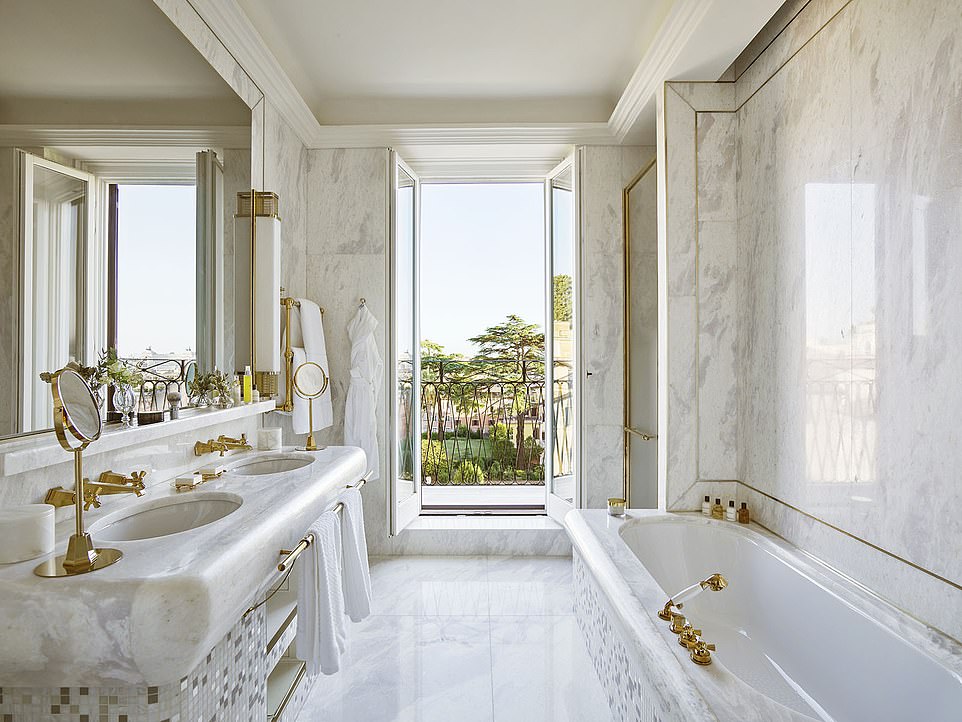
Hotel Eden, pictured, is situated on the old Pincian Hill, on the site where Julius Caesar and Augustus Caesar had their villas
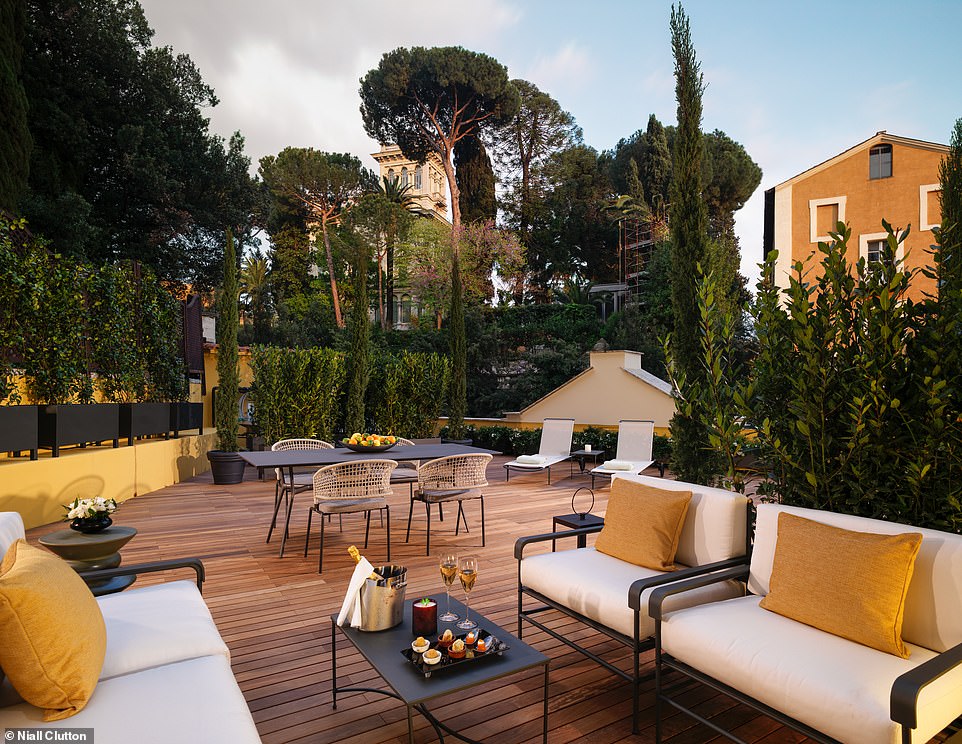
Hotel Eden was built in 1889 in the Belle Epoque style, and was ‘wonderfully’ refurbished in 2018
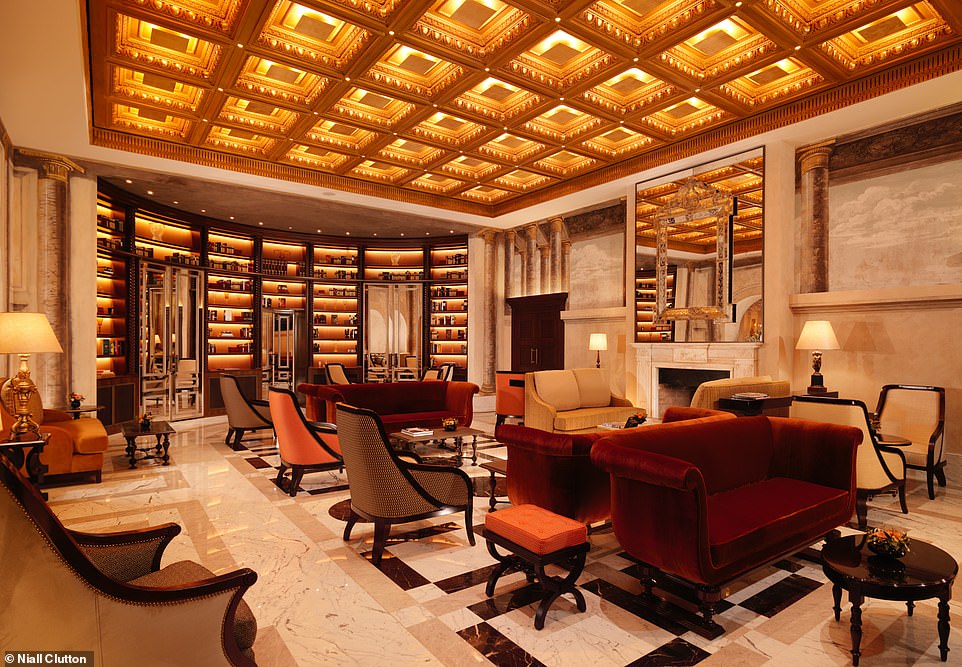
Hotel Eden lies just off Via Veneto, which is one of the most expensive streets in Rome
Our final sojourn was at the sumptuous Hotel Eden Rome, just off the Via Veneto.
Situated on the old Pincian Hill, on the site where Julius Caesar and Augustus Caesar had their villas, the hotel was built in 1889 in the Belle Epoque style, and was wonderfully refurbished in 2018.
Its 98 stylish rooms, with their Murano glass, walk-in wardrobes, and exquisite mosaics will transport you to a world of luxe that you will never want to leave behind.
The rooftop bar and wonderful Giardino restaurant has unrivalled views of Rome and is one of the buzziest places in the city.
No wonder it was such a favourite of Sigmund Freud and film director Federico Fellini, who lived in nearby Via Margutta.
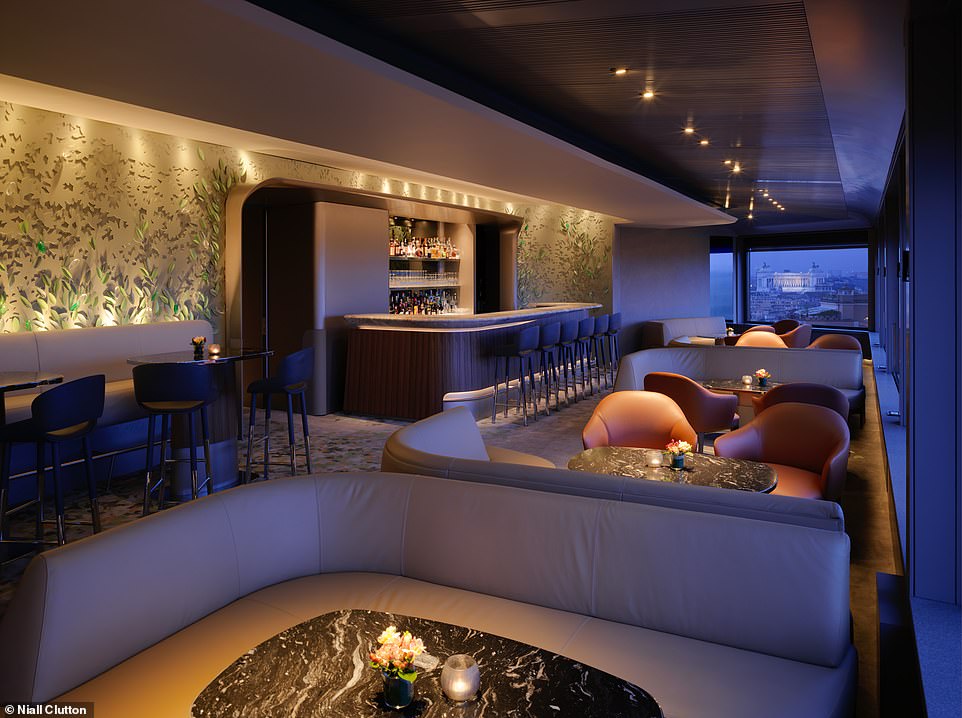
Hotel Eden’s bar offers similarly breathtaking views to those afforded to guests of the Hassler and Hotel De La Ville
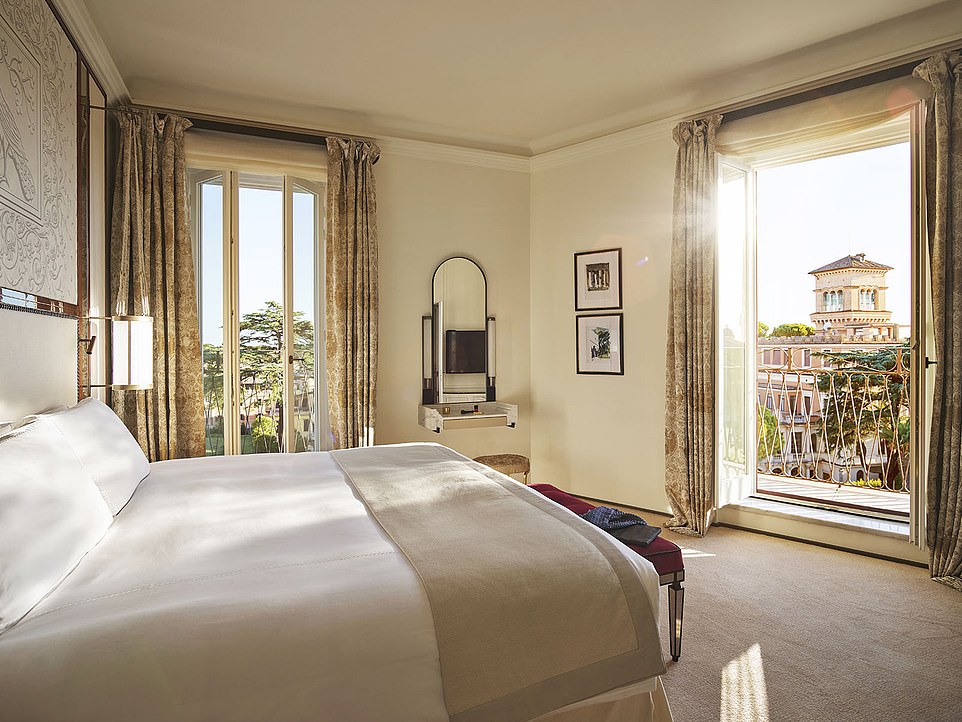
Frank writes: ‘Hotel Eden’s 98 stylish rooms, with their Murano glass, walk-in wardrobes, and exquisite mosaics will transport you to a world of luxe that you will never want to leave behind’
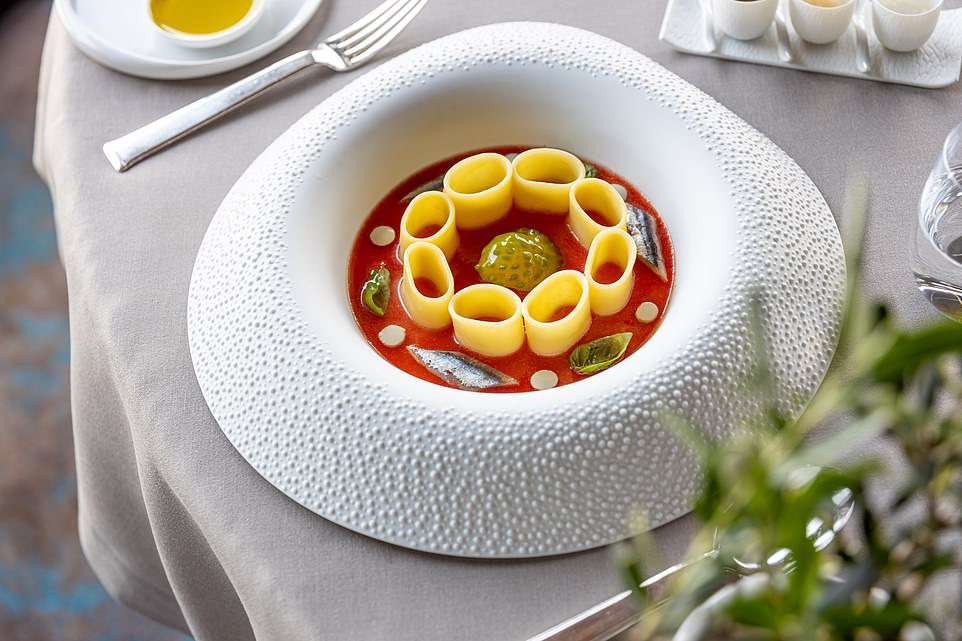
One of the mouthwatering dishes served up at Hotel Eden’s La Terrazza restaurant – which is one of the best eateries in Rome, according to Frank
La Terrazza at Hotel Eden is one of the best restaurants in Rome, overseen by chef Fabio Ciervo, where visitors will enjoy exquisite courses such as spaghetti with pecorino and Madagascan wild black pepper, flavoured with rosebuds and a main course of crab extract with coffee.
Rome has always been a culinary colossus, and we made the most of the once-in-a-lifetime opportunity to make reservations at some of the best restaurants at very short notice.
Ever since the Michelin-starred Per Me opened its doors in 2015, the hugely talented chef Guilio Terrinoni has been wooing customers with inventive dishes, thoughtful service and an incredible wine list in the centro storico district.
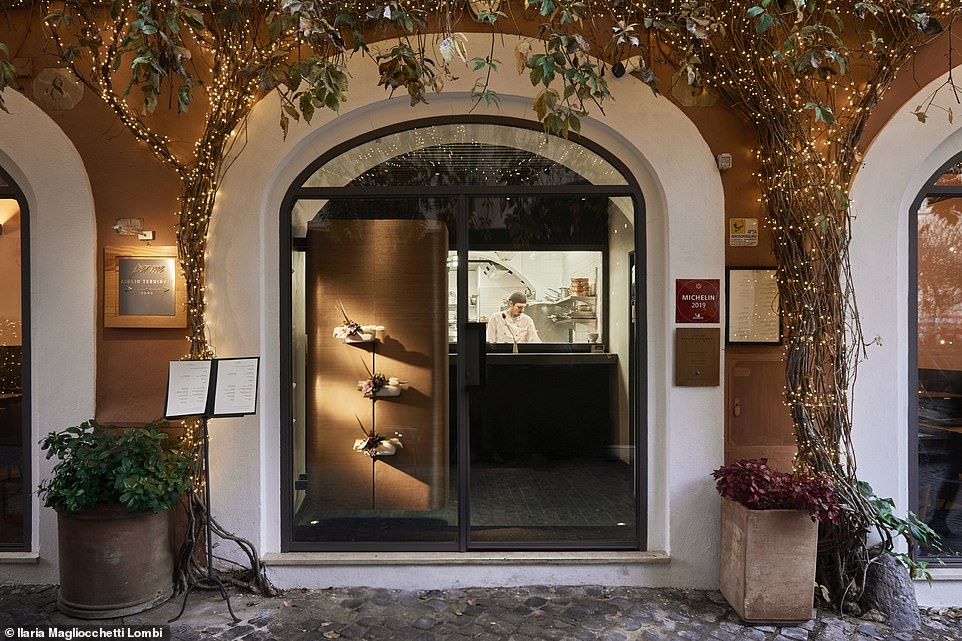
Ever since the Michelin-starred Per Me, pictured, opened its doors in 2015, the hugely talented chef Guilio Terrinoni has been wooing customers with inventive dishes, says Frank
There were so many outstanding courses. The starter of roasted cuttlefish accompanied by sea urchins, dipped in a sauce of bagna cauda with Jerusalem artichoke on the side, and Giulio’s take on classic Roman pasta dish, the cacio e pepe spaghetti served with courgette flower and anchovies will live long in the memory.
The Sea Rhythms menu (four dishes paired with four glasses of wine) was exceptional and the Head Hands Heart menu is the one for meat-eaters, with the stand-out being Guinea fowl, cappellacci vegetables, cesanese butter, smoked pecorino and marjoram.
THE CHURCH WHERE THEY SWAPPED A CARAVAGGIO FOR A RUBENS
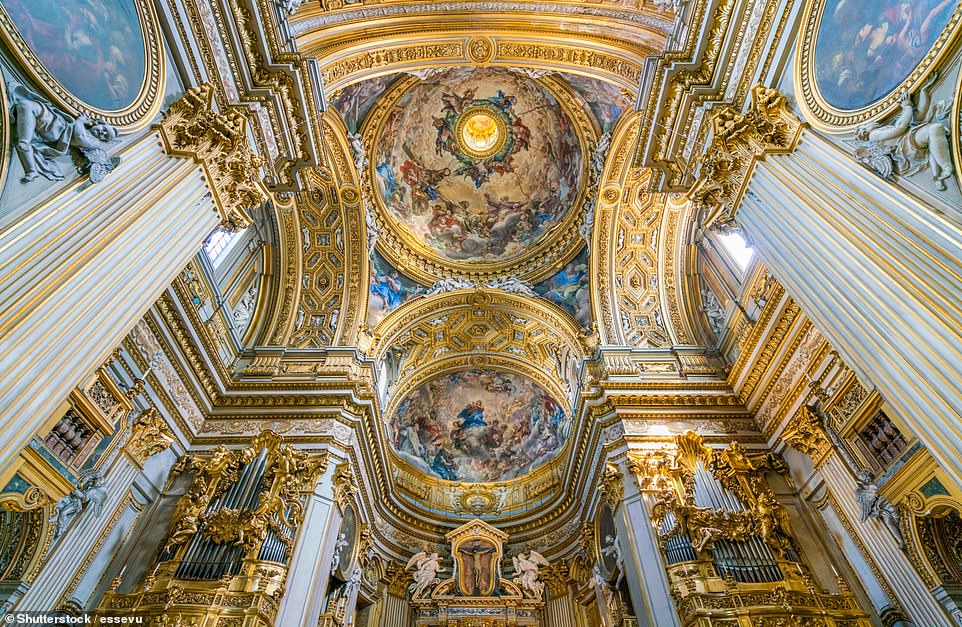
Chiesa Nuova, pictured, was built in the 16th century – and is definitely worth visiting, writes Frank
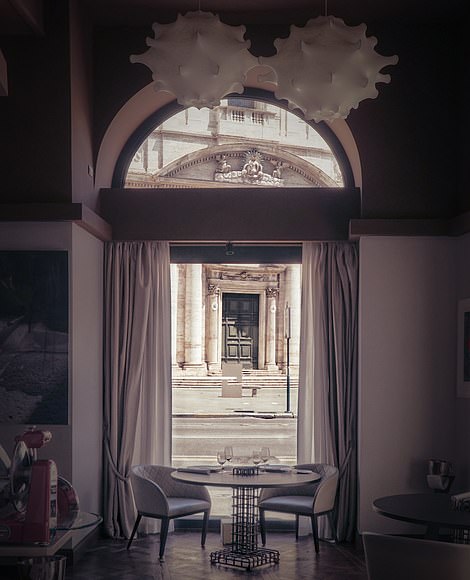
At Michelin-starred Pipero Rome, pictured, ‘culinary wizard Ciro Scamardella will bowl you over with his flamboyant dishes’
Few visitors to Rome venture to the beautiful Chiesa Nuova, or New Church, a very deceptive name for a church that was built in the 16th century. Caravaggio’s altarpiece of the Entombment of Christ was intended for this place of worship, but somehow it got diverted to the Vatican’s Pinacoteca.
New Church is still worth visiting, if only to see Rubens’ slate and copper altarpiece – a wonderful substitute for the Caravaggio.
Afterwards, reward yourself with lunch at the Michelin-starred Pipero Rome, in a fabulous location overlooking the church. Here the culinary wizard Ciro Scamardella will bowl you over with his flamboyant dishes with deceptively simple names such as a starter of mushrooms, foie gras, blueberries; and main courses of Genoese octopus in ravioli, cauliflower, and vanilla ravioli with scallop and meat pluma, basil pesto and radishes, all of which are best described as historic.
The simplicity of the desserts – ‘reconstruction of a lime’ and ‘almond Lychee and Rose’ – belie the artistry of their presentation and the sensual pleasures that await the diner. This is where the beau monde of Rome can be spotted at lunchtime any day of the week.
TELL NO LIES AT THE MOUTH OF TRUTH
The next destination was the Mouth of Truth, made famous by Audrey Hepburn and Gregory Peck in Roman Holiday. It is situated on the portico wall of the 8th-century Santa Maria in Cosmedin Church, at the Piazza della Bocca della Verita, originally the site of the ancient cattle market, the Forum Boarium.
The Mouth of Truth was the original medieval lie detector – it is said that if you put your hand in the mouth of the 1st-century disc, it will bite your hand off if you have told an untruth.
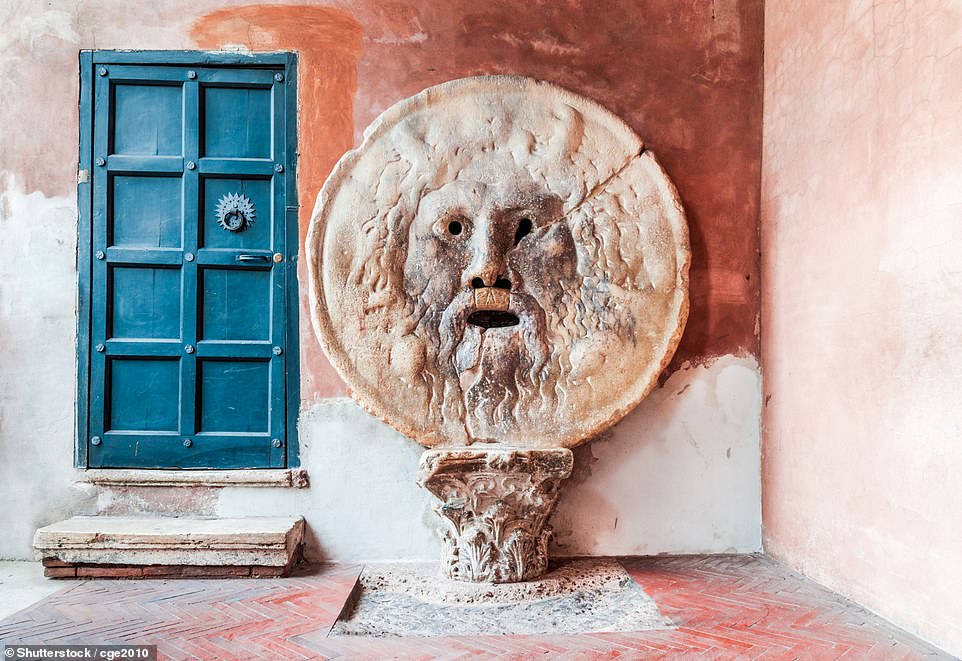
It is said that if you put your hand in the mouth of The Mouth of Truth, pictured, it will bite your hand off if you have told an untruth
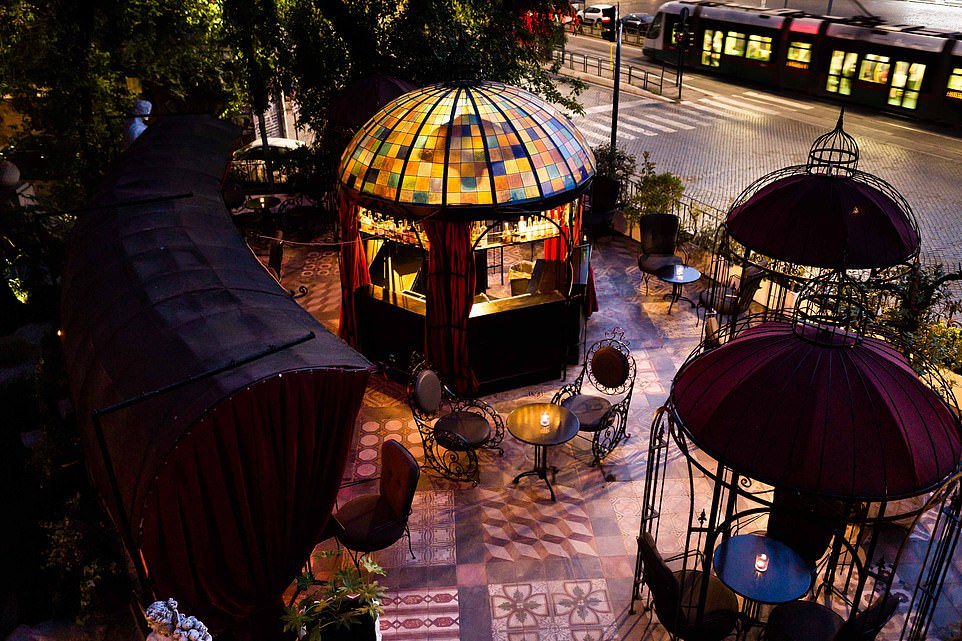
Restaurant Marco Martini, pictured, is ‘situated in a wonderful winter garden’
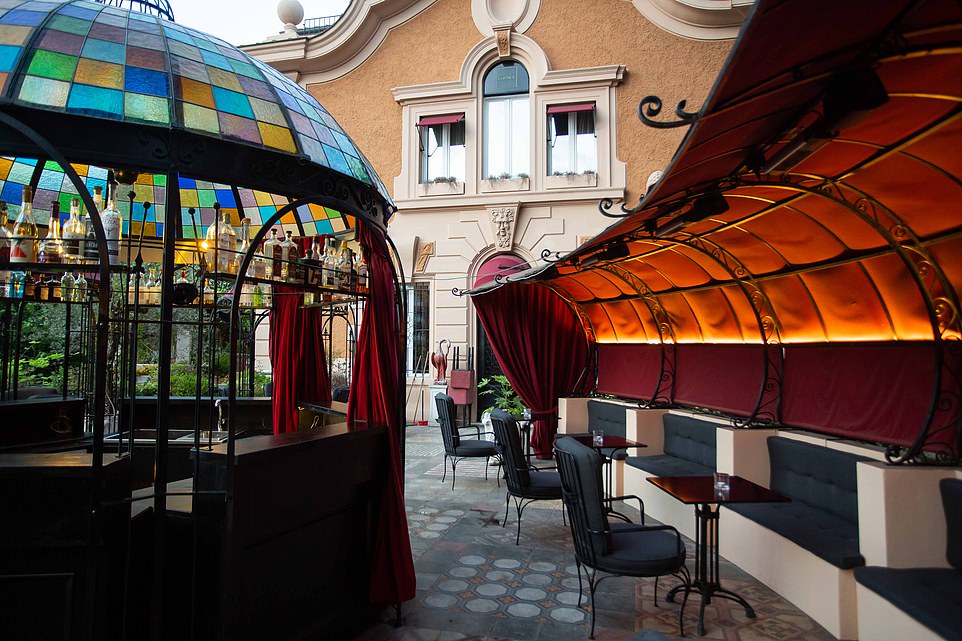
At romantic Marco Martini, says Frank, ‘each table is filled with well-to-do Romans enjoying sensational dishes with highly original presentation’
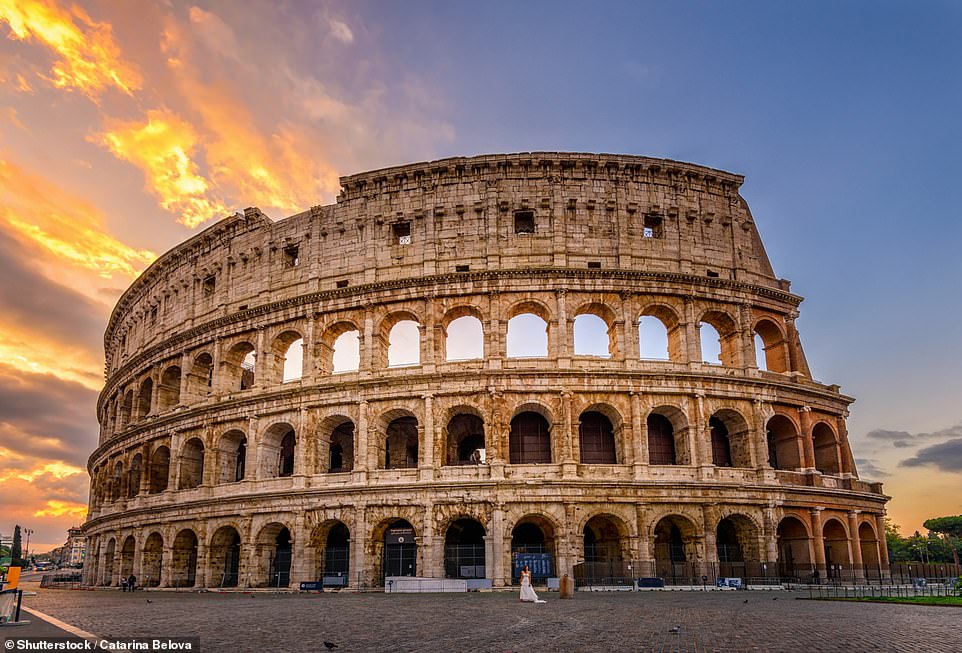
Rome’s Colosseum is one of the city’s must-see sights. It was the largest amphitheatre ever built by the Roman Empire
We also popped into the church to see the encased skull of St Valentine, decorated with a floral crown.
After a trip to the nearby Colosseum, there is no more special place for dinner than the nearby Marco Martini restaurant, situated in a wonderful winter garden.
It is a romantic spot with each table filled with well-to-do Romans enjoying sensational dishes with highly original presentation. Our starter arrived in a bird’s nest, our main courses of spaghettone cockles, almonds and burned leek and piglet apple, potatoes and mustard were terrific.
THROUGH THE KEYHOLE WITH THE KNIGHTS OF MALTA
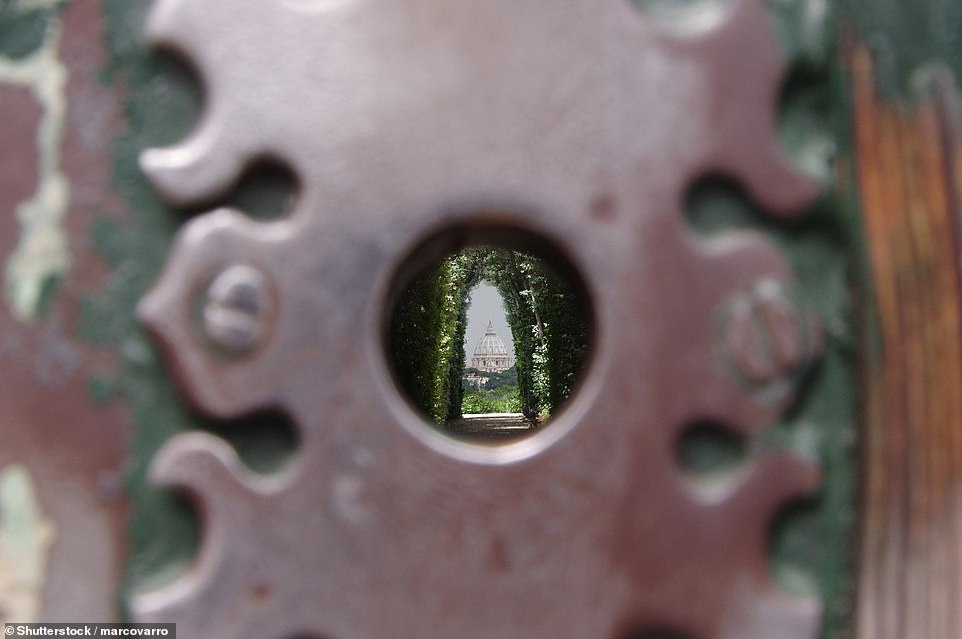
The keyhole of the Knights of Malta has a perfectly framed view of St Peter’s Basilica
No trip to Rome would be complete without a visit to one of Rome’s secret attractions – the keyhole of the Knights of Malta with its perfectly framed view of St Peter’s Basilica. The keyhole is part of the property owned by the Priory of the Knights of Malta, the secretive organisation that featured in Da Vinci Code and is the world’s oldest chivalric order, dating back to the 11th century.
It lies in the Piazza Cavalieri di Malta on Aventine Hill, designed in 1765 by Giovan Battista Piranesi.
According to Roman mythology, Aventine Hill was imagined as a sacred ship that would set sail for the gods, so Piranesi incorporated many nautical symbols and elements into his creation. The ornamental door represents the entrance to the deck of the ship, while the manicured gardens within are the rope and the rigs. As I peer through the keyhole, the vista is majestic, with St Peter’s framed in all its glory.
I contemplate the serenity of the view of a city that has survived pandemics as fierce as Covid.
Julius Caesar once proclaimed Veni Vidi Vici (I came, I saw, I conquered) after his epic Pontic Victory. The Romans have seen off greater foes than coronavirus. To paraphrase Caesar, Covid has come, it has been seen, but it has not conquered… Veni. Vidi. Sed Non Vici.
Frank Mannion is a film director whose feature documentary, Quintessentially British, will be released on June 3, 2022, to coincide with the Queen’s Platinum Jubilee.
Source link : https://www.dailymail.co.uk/travel/escape/article-10069503/Mission-la-dolce-vita-stay-Romes-finest-hotel-time-Tom-Cruise.html












